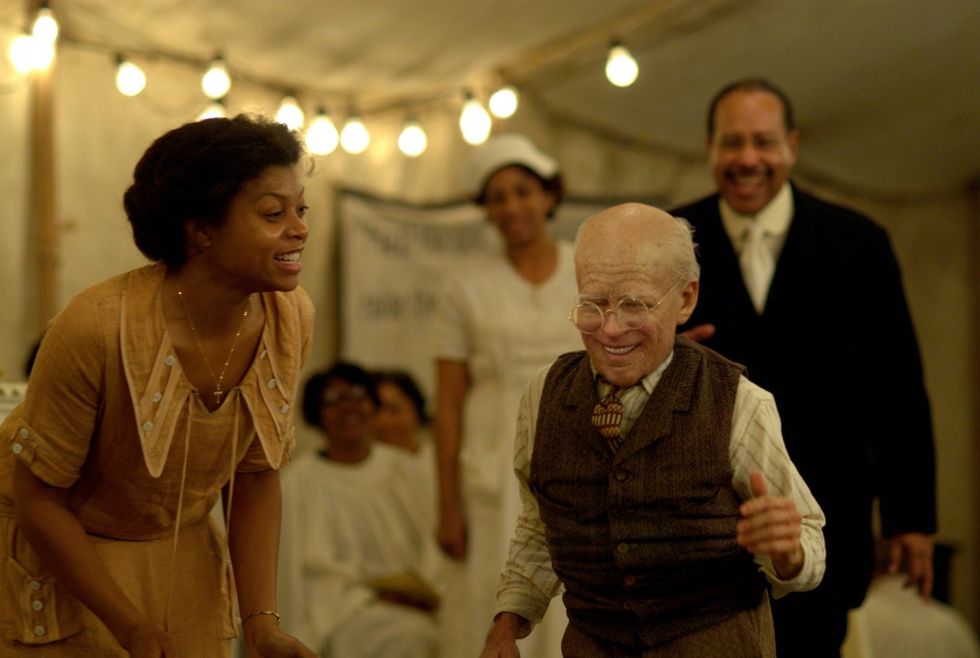“Our lives are determined by opportunities; even the ones we miss.” ~ Benjamin Button
The Curious Case of Benjamin Button (2008) is very curious indeed. It’s never so boring that I want to stop watching, but it feels like a 1000-piece puzzle that’s missing the last piece. The technical elements are impossible to ignore—among its thirteen Oscar nominations include Best Cinematography, Best Art Direction, and Best Actor—but while individual aspects are laudable, the overall product is never as high as its aspirations.
Based on a F. Scott Fitzgerald short story, director David Fincher and screenwriter Eric Roth present The Curious Case of Benjamin Button as a unique exploration of time and the inevitable slow release of death. The film opens with a hurricane and a hospital; an old woman awaits death while her daughter, Caroline Fuller (Julia Ormond) sits at her bedside. With her last moments of life, Caroline’s mother has her read a diary written by Benjamin Button. Here the real story begins: In New Orleans on Armistice Day, 1918, Benjamin Button (Brad Pitt) is born with the shriveled body of an old man. With the same “righteous horror” as Disney's Frollo, Benjamin’s father abandons his son on the doorstep of a nursing home run by Queenie (Taraji P. Henson). It slowly dawns on Benjamin that he is aging backward, growing less frail with every passing year. After his 18th birthday (though he looks around 60), Benjamin leaves home to begin his adventures. He works on a tugboat under the tutelage of a drunk Irishman, drinks tea with a British spy in Russia, joins the U.S. Navy, and most importantly falls in love with the free-spirited Daisy Fuller (Cate Blanchett). Benjamin lives life like everyone else does—the difference is that he needs smaller diapers once his time is up.
Steven Spielberg’s Lincoln (2012) is a prime example of condensing the conflict to the most dramatic moment. The original 500-page draft for Lincoln spanned his entire term in office, but after years of rewriting the film focused on the ratification of the 13th Amendment and Lincoln’s last few months of life. The reason I bring it up is that The Curious Case of Benjamin feels like it also was originally written as this epic beast of a script. Except, unlike Lincoln, Fincher failed to condense Benjamin Button’s life to the heart of the story, which is the existential crisis of aging in the wrong direction. Parenthood is the purest emotional manifestation of this conflict, because this movie believes that the chronological movement—forwards or backwards—is not consequential to life so long as a person has nothing left to leave behind. Even romantic love, as you would appear a child in your lover’s wizened eyes, is unaffected since the couple begins and ends a life cycle for the same amount of time. However, once a child is born, everything changes. As Benjamin Button says looking at his daughter, “She needs a father, not a playmate.” The last thirty minutes of The Curious Case of Benjamin Button made me as emotional as I felt with The Hurt Locker and Interstellar, because it raises the stakes for what Benjamin Button has to sacrifice to be himself.
The biggest problem with the last thirty minutes is you have to wade through the first two hours to get there. The plot structure and leisurely pacing are highly similar to screenwriter Eric Roth’s classic Forrest Gump, but without the comedy. The Curious Case of Benjamin Button misses out on an opportunity to expand a compelling conflict and instead slogs through the first forty years of his life. It isn’t a complete waste of time because there are important parallels and foreshadowing that make the final scenes more impactful, but I constantly felt as though I was waiting for something better just beyond the horizon.
Benjamin Button is simply too passive of a character to capture an audience’s interest for that length of time. For the first two hours, Benjamin has an annoying willingness to accept whatever happens, allowing himself to be a punching bag to life’s whims. The film also gives him an extraordinary life—his reverse aging effect, working on a tugboat, fighting in the U.S. Navy during WWII, and having seemingly irresistible sexual charm. (For a man who’s aging backwards, he certainly has a lot of secret rendezvous, which raises certain questions about cougars and pedophilia that I won’t go into.) But tedious dialogue, overly-explained metaphors, and poor character construction makes Benjamin Button’s life seem the exact opposite of extraordinary.
A better way to edit the film would have been to make Benjamin Button’s life as a parent the main plotline, and interweave memories of his first half in-between. The acting, visual effects, makeup, and production design are, as separate pieces, immensely commendable, but the film doesn’t do enough to make Benjamin Button’s life a curious story and not merely a curiosity.
Rating: B- | 2.5 stars



 Photo by
Photo by  Photo by
Photo by  Photo by
Photo by 



















